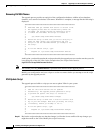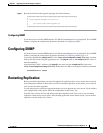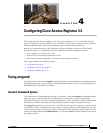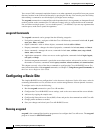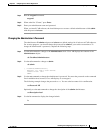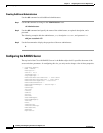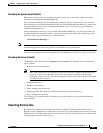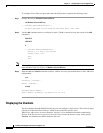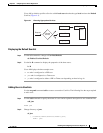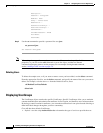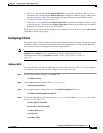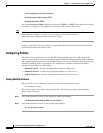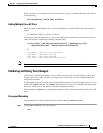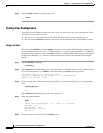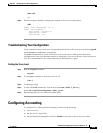
4-6
Installing and Configuring Cisco Access Registrar, 4.2
OL-17221-02
Chapter 4 Configuring Cisco Access Registrar 4.2
Configuring a Basic Site
To configure Cisco AR to use ports other than the default ports, complete the following steps:
Step 1 Change directory to /Radius/Advanced/Ports.
cd /Radius/Advanced/Ports
[ //localhost/Radius/Advanced/Ports ]
<no ports specified, will be using the well-known ports, 1645, 1646>
Step 2 Use the add command (twice) to add ports in pairs. (The ls is entered to show the results of the add
command.)
add 1812
add 1813
ls
[ //localhost/Radius/Advanced/Ports ]
Entries 1 to 2 from 2 total entries
Current filter: <all>
1812/
1813/
Note After modifying Access Registrar’s default ports setting, to continue using ports 1645 and 1646, you
must add them to the list of ports in /Radius/Advanced/Ports.
Step 3 Enter the save and reload commands to affect, validate, and save your modifications to the CAR server
configuration.
save
Validating //localhost...
Saving //localhost...
reload
Reloading Server 'Radius'...
Server 'Radius' is Running, its health is 10 out of 10
Displaying the UserLists
The first subobject in the RADIUS hierarchy that you can configure is the Userlists. The UserLists object
contains all of the individual UserLists, which in turn contain the specific users.
When Cisco AR receives an Access-Request, it directs it to an authentication and/or authorization
Service. If the Service has its type set to local, the Service looks up the user’s entry in the specific
UserList, and authenticates and/or authorizes the user.



